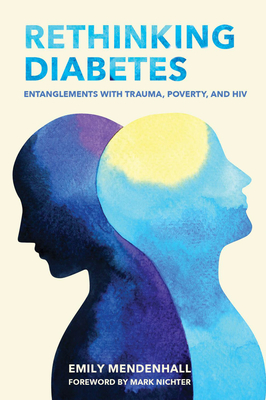

 Cornell University Press
Cornell University Press
Rethinking Diabetes: Entanglements with Trauma, Poverty, and HIV


Key Metrics
- Emily Mendenhall
- Cornell University Press
- Hardcover
- 9781501738302
- 9.02 X 5.98 X 0.69 inches
- 1.15 pounds
- Social Science > Anthropology - Cultural & Social
- English
 Secure Transaction
Secure TransactionBook Description
In Rethinking Diabetes, Emily Mendenhall investigates how global and local factors transform how diabetes is perceived, experienced, and embodied from place to place. Mendenhall argues that the link between sugar and diabetes overshadows the ways in which underlying biological processes linking hunger, oppression, trauma, unbridled stress, and chronic mental distress produce diabetes. The life history narratives in the book show how deeply embedded these factors are in the ways diabetes is experienced and (re)produced among poor communities around the world.
Rethinking Diabetes focuses on the stories of women living with diabetes near or below the poverty line in urban settings in the United States, India, South Africa, and Kenya. Mendenhall shows how women's experiences of living with diabetes cannot be dissociated from their social responsibilities of caregiving, demanding family roles, expectations, and gendered experiences of violence that often displace their ability to care for themselves first. These case studies reveal the ways in which a global story of diabetes overlooks the unique social, political, and cultural factors that produce syndemic diabetes differently across contexts.
From the case studies, Rethinking Diabetes clearly provides some important parallels for scholars to consider: significant social and economic inequalities, health systems that are a mix of public and private (with substandard provisions for low-income patients), and rising diabetes incidence and prevalence. At the same time, Mendenhall asks us to unpack how social, cultural, and epidemiological factors shape people's experiences and why we need to take these differences seriously when we think about what drives diabetes and how it affects the lives of the poor.
Author Bio
Professor Emily Mendenhall is a medical anthropologist and Professor in the Science, Technology, and International Affairs (STIA) Program in the Edmund A. Walsh School of Foreign Service at Georgetown University. Prof. Mendenhall has published widely in anthropology, medicine, and public health and is the inaugural co-editor-in-chief of Social Science and Medicine—Mental Health.
Prof Mendenhall led a Series of articles on Syndemics in The Lancet in 2017 and has published several books, including Rethinking Diabetes: Entanglements with Trauma, Poverty, and HIV (2019), Syndemic Suffering: Social Distress, Depression, and Diabetes among Mexican Immigrant Women (2012), and Global Mental Health: Anthropological Perspectives (2015). In 2017, Dr. Mendenhall was awarded the George Foster Award for Practicing Medical Anthropology by the Society for Medical Anthropology.
Prof. Mendenhall’s newest book is forthcoming March 2022. Unmasked: COVID, Community, and the Case of Okoboji is a study of how people responded to COVID-19 in her hometown in northwest Iowa. Unmasked explores political priorities, cultural squabbles, and business interests that undermined public health efforts when no mandates were in place.
Some of this research on how people perceived and experienced coronavirus in rural Iowa has been published in Vox as well as Social Science and Medicine and Global Public Health. Prof Mendenhall also has ongoing research on syndemics in Johannesburg, South Africa, where she has worked for nearly a decade. She is the Principle Investigator of the National Institutes of Health Fogarty International Center study “Soweto Syndemics” at the University of the Witwatersrand, where she holds an honorary appointment.
Source: Georgetown University
Videos




Community reviews
Write a ReviewNo Community reviews